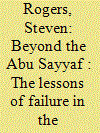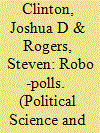| Srl | Item |
| 1 |
ID:
049879


|
|
|
|
|
| Publication |
Jan-Feb 2004.
|
| Summary/Abstract |
Washington has made the fight against radical Muslim separatists in the Philippines a critical front in its war on terrorism. But its one-size-fits-all approach reflects a dangerous misunderstanding of the problem -- and could make things worse.
|
|
|
|
|
|
|
|
|
|
|
|
|
|
|
|
| 2 |
ID:
165490


|
|
|
|
|
| Summary/Abstract |
More than 60 years ago, Angus Campbell offered an explanation for why the president’s party regularly loses congressional seats in midterm elections. He argued that peripheral voters “surge” to the polls in presidential elections and support the president’s congressional co-partisans but “decline” to turn out in the midterm. In his turnout-based explanation for midterm loss, Campbell speculated that “bad weather or an epidemic may affect the vote” but largely dismissed weather’s utility to test his theory (Campbell 1960, 399). I revisit Campbell’s speculation and employ a new identification strategy to investigate the “surge and decline” account of midterm loss. I show that as the costs of voting increase—due to above-average rainfall on Election Day—the strength of the relationship between presidential and congressional voting weakens.
|
|
|
|
|
|
|
|
|
|
|
|
|
|
|
|
| 3 |
ID:
154902


|
|
|
|
|
| Summary/Abstract |
Theories of electoral accountability predict that legislators will receive fewer votes if they fail to represent their districts. To determine whether this prediction applies to state legislators, I conduct two analyses that evaluate the extent to which voters sanction legislators who cast unpopular roll-call votes or provide poor ideological representation. Neither analysis, however, produces compelling evidence that elections hold most state legislators accountable. I discover that legislators do not face meaningful electoral consequences for their ideological representation, particularly in areas where legislators receive less media attention, have larger staffs, and represent more partisan districts. In a study of individual roll-call votes across 11 states, I furthermore find a weak relationship between legislators’ roll-call positions and election outcomes with voters rewarding or punishing legislators for only 4 of 30 examined roll calls. Thus, while state legislators wield considerable policymaking power, elections do not appear to hold many legislators accountable for their lawmaking.
|
|
|
|
|
|
|
|
|
|
|
|
|
|
|
|
| 4 |
ID:
121629


|
|
|
|
|
| Publication |
2013.
|
| Summary/Abstract |
After the 2012 Republican New Hampshire primary, 159 poll results were released prior to the subsequent nomination contests in the Republican presidential primary. More than two-thirds of these polls relied on interactive voice response (IVR) software to conduct the interviews. We evaluate the ability of polls to predict the vote-share for the Republican candidates Romney, Santorum, and Gingrich. We find no overall difference in the average accuracy of IVR and traditional human polls, but IVR polls conducted prior to human polls are significantly poorer predictors of election outcomes than traditional human polls even after controlling for characteristics of the states, polls, and electoral environment. These findings provide suggestive, but not conclusive, evidence that pollsters may take cues from one another given the stakes involved. If so, reported polls should not be assumed to be independent of one another and so-called poll-of-polls will be misleadingly precise.
|
|
|
|
|
|
|
|
|
|
|
|
|
|
|
|